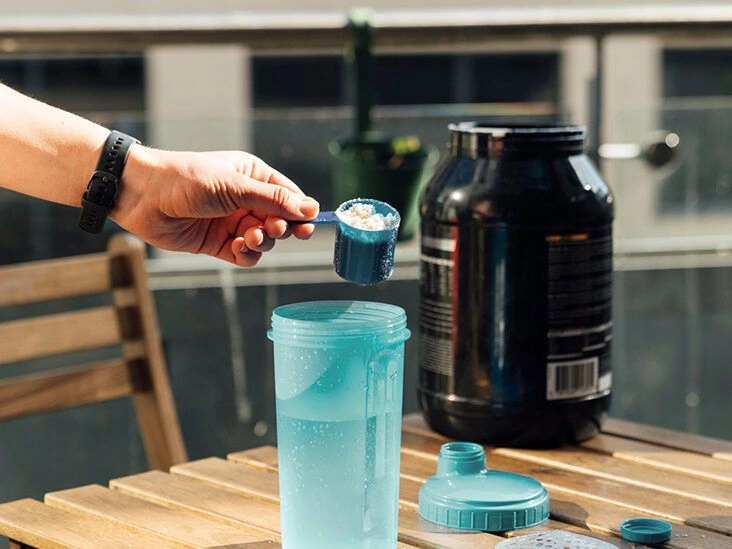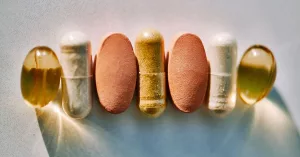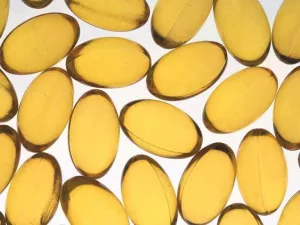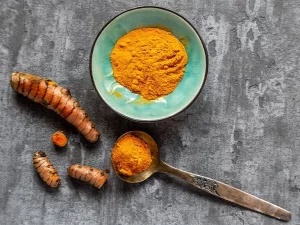Several nutritional supplements can support muscle growth when combined with resistance training and a balanced diet. Common examples include creatine and various protein products.
If you work out consistently, you probably want to maximize the benefits of your efforts.
One key outcome of training is gaining muscle and strength. Carrying an appropriate amount of muscle enables you to perform better both during workouts and in everyday activities.
There are three primary factors required for optimal muscle growth:
- consuming more calories than you expend
- taking in more protein than you break down
- following a training plan that sufficiently challenges your muscles
While it’s possible to satisfy all three without supplements, certain supplements can help you reach these objectives more easily.
This article summarizes supplements that may assist you in building more muscle alongside your exercise routine.
Creatine
Creatine is a compound produced naturally in the body that supplies energy to muscles and other tissues.
Supplementing with creatine can raise muscle creatine stores above typical levels.
Creatine influences muscle cells and exercise capacity, promoting increases in muscle size. Indeed, a body of research shows creatine enhances muscle strength.
That’s beneficial if your goal is greater muscle—improved strength enables better performance in training, which over time can lead to larger gains in muscle mass.
Creatine also draws water into muscle cells. This mild cell swelling may trigger signals that favor muscle growth.
Additionally, creatine may boost concentrations of growth-related hormones such as IGF-1.
Research also indicates creatine can reduce protein breakdown in muscle tissue.
Overall, many investigators have examined creatine combined with resistance training, and the evidence indicates creatine can promote muscle accumulation.
Creatine also has a generally favorable safety profile.
If you want a supplement to aid muscle growth, creatine is a top option to consider.
Creatine supplementation in females
Creatine characteristics differ between men and women.
Research indicates women typically have 70% to 80% lower creatine stores than men and metabolize creatine differently. Creatine levels may fall during hormone-related phases such as menstruation, pregnancy, and menopause.
For that reason, creatine supplementation might be particularly useful before, during, and after these estrogen-related changes.
Studies show creatine can improve strength, exercise performance, and muscle size in women.
When paired with resistance training, creatine may also positively affect bone density.
Moreover, creatine supplementation could benefit mood, cognition, and sleep.
Experts generally consider the same dosing approaches suitable for women as for men.
Still, consult a physician before starting any supplement regimen so they can evaluate your medical history, recommend appropriate dosing, and rule out potential drug interactions.
Summary»Our PicksCreatine Approved by Dietitians, Tested by UsCreatine is likely the single most effective supplement for muscle growth for both men and women. Numerous studies support its ability to increase muscle mass.
Protein supplements
Adequate protein intake is essential for muscle gain. To build muscle, you must consume more protein than your body degrades.
Although it’s feasible to obtain all necessary protein from whole foods, some people struggle to meet their needs. If that’s the case, a protein supplement may be helpful.
Popular protein supplements include whey, casein, and soy. Other products use protein isolated from eggs, split peas, rice, or hemp.
Research shows that adding supplemental protein results in slightly greater muscle gains in people who exercise compared with adding extra carbohydrates. The benefit tends to be larger for individuals who are not already meeting their protein requirements.

A meta-analysis including adult men and women suggests total protein intake (from animal sources, fish, and eggs) is important for building and preserving muscle mass.
However, in women, the relationship between total protein intake and muscle mass was influenced by their level of physical activity.
Many people ask how much protein they should consume. For active individuals aiming to gain muscle, 0.6 to 0.9 grams of protein per pound of body weight (or roughly 1.2 to 2.0 grams per kilogram) may be optimal.
Summary»Our PicksProtein Powder Approved by Dietitians, Tested by UsGetting enough protein is crucial for maximizing muscle growth. If you already meet your protein needs via food, a protein supplement is unnecessary.
Weight gainers
Weight gainer products are designed to conveniently boost calorie and protein intake. They’re commonly used by people who struggle to gain weight and muscle even when eating a lot and training hard.
Calorie contents vary widely, and some weight gainers provide over 1,000 calories per serving.
Although many assume most calories in these products come from protein, the majority usually comes from carbohydrates.
Typical servings contain 75 to 300 grams of carbs, 20 to 60 grams of protein, and 0 to 15 grams of fat.
While weight gainers can help you get more calories, they don’t offer any unique metabolic magic.
A small study in sedentary adults found that dramatically increasing caloric intake can raise lean mass if protein intake is adequate.
However, a trial in resistance-trained men suggests that using a weight gainer may not necessarily be effective for increasing lean mass.
In general, weight gainers are recommended only if you find it difficult to consume sufficient food and prefer drinking a high-calorie shake to eating more solid meals.
SummaryWeight gainers are high-calorie formulas meant to help you increase calorie and protein intake. They’re useful primarily for those who struggle to meet caloric needs from food alone.
Beta-alanine
Beta-alanine is an amino acid that can reduce fatigue and enhance exercise performance. It may also aid muscle growth when combined with a training program.
In one study, taking 4 g of beta-alanine daily for 8 weeks increased lean body mass more than a placebo in male collegiate wrestlers and football players.
Another report found that adding beta-alanine to a 6-week high-intensity interval training regimen increased lean mass by about 1 lb (0.45 kg) more than placebo in male participants.
However, a 2022 review of 20 studies concludes that beta-alanine supplementation is unlikely to change body composition, regardless of dose or combination with resistance training.
Consequently, further research is required to clarify the potential muscle-building benefits of beta-alanine.
SummaryBeta-alanine can improve exercise performance. Some evidence suggests it might increase muscle mass in response to training, but more studies are needed.
Branched-chain amino acids
Branched-chain amino acids (BCAAs) include leucine, isoleucine, and valine. They occur in most protein-rich foods, especially animal products like meat, poultry, eggs, dairy, and fish.
BCAAs play a vital role in muscle growth and constitute roughly a portion of the amino acids in muscle tissue.
Virtually everyone obtains BCAAs from food daily, yet supplemental BCAAs remain popular.
A small trial in resistance-trained men suggested BCAAs might support muscle gains or reduce muscle loss versus placebo.
However, a larger 2021 study with male and female participants found BCAAs did not preserve lean mass during a weight-loss program.
It’s likely BCAA supplements are useful mainly when dietary protein is insufficient.
Although they may help if your protein intake is poor, more evidence is needed before recommending BCAAs as a primary supplement for muscle growth.
Branched-chain amino acids (BCAAs) in females
A small study involving postmenopausal women found that 8 weeks of resistance training improved muscle mass and strength, but adding BCAA supplements did not produce additional significant gains.
SummaryBCAAs are important for muscle growth and are abundant in many foods. It remains uncertain whether supplemental BCAAs help when you already consume sufficient high-quality protein.
Beta-hydroxy beta-methylbutyrate
Beta-hydroxy beta-methylbutyrate (HMB) is a metabolite formed when the body breaks down the amino acid leucine.
HMB contributes to some of the beneficial effects of dietary protein and leucine and may be particularly useful for reducing muscle protein breakdown.
Although the body produces HMB naturally, supplemental HMB raises levels and may provide additional muscle benefits.
A review of studies in previously untrained adults found that 3 to 6 g of HMB per day can enhance lean body mass gains from resistance training.
By contrast, a review indicates similar HMB doses are likely not effective for increasing muscle mass in trained athletes or people with weightlifting experience.
This suggests HMB may be most beneficial for those beginning resistance training or increasing workout intensity.
SummaryHMB may help boost muscle mass in people new to weight training, but it seems less useful for those with training experience.
Other supplements
A number of other supplements claim to increase muscle, including conjugated linoleic acid (CLA), testosterone enhancers, glutamine, and carnitine.
However, the evidence is mixed:
- Conjugated linoleic acid (CLA): CLA describes a group of omega-6 fats with varied effects. Reviews of CLA for muscle gains report inconsistent findings, and benefits are unclear.
- Testosterone boosters: Supplements such as D-aspartic acid, Tribulus terrestris, fenugreek, DHEA, and ashwagandha likely only help people with low testosterone.
- Glutamine and carnitine: These are unlikely to increase muscle mass in young or middle-aged active individuals. A small study suggests carnitine might offer some muscle growth benefits in older adults.
SummaryMany supplements claim to promote muscle growth, but evidence that they work for healthy, active individuals is limited.
The bottom line
Supplements cannot compensate for inadequate nutrition or poor training.
To build muscle, you must eat sufficient calories and protein and engage in appropriate resistance exercise. Once your diet and training are optimized, supplements may be worth considering.
Creatine and protein supplements are likely the most effective options for supporting muscle gain, though other supplements may help specific individuals under certain circumstances.

























Leave a Reply
You must be logged in to post a comment.